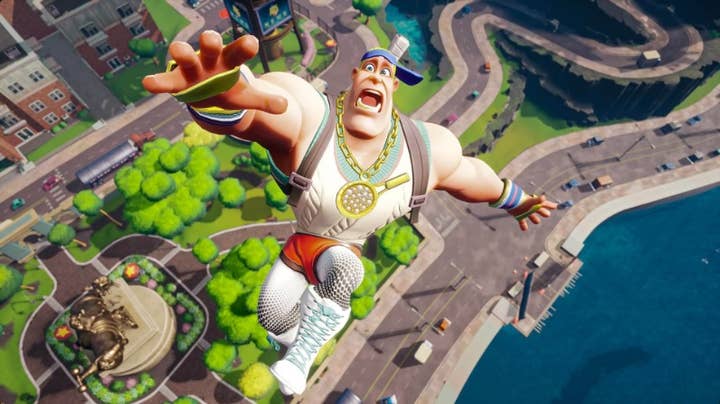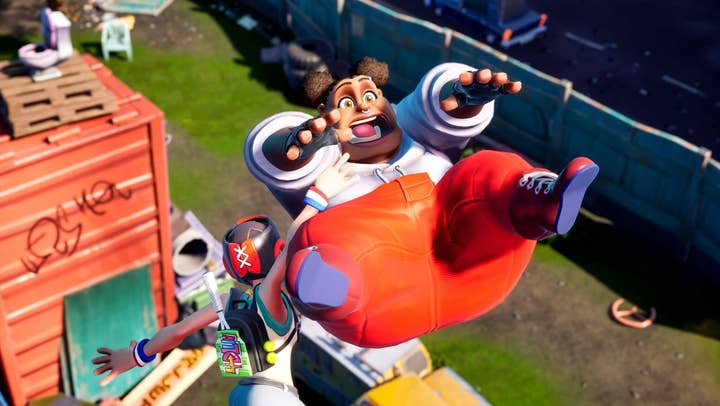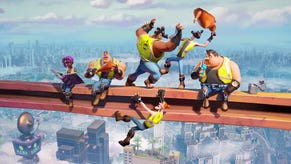Rumbleverse marks a new era for Iron Galaxy
Co-CEO Adam Boyes talks about the evolution of the studio's strategy and making melee work in battle royale
Last week, Iron Galaxy launched Rumbleverse, its first new product in three years.
Speaking with GamesIndustry.biz, Iron Galaxy co-CEO Adam Boyes traces the game's origins back to spitballing ideas with co-CEO Chelsea Blasko, who suggested, "We should do a 'rasslin' game!"
"From that moment on, having the visualization of choke-slamming someone off a 40-story building and being able to make something we thought could stand out, that was biggest thing," Boyes says.
"Having the visualization of choke-slamming someone off a 40-story building and being able to make something we thought could stand out, that was biggest thing"
The end result is Rumbleverse, a free-to-play 40-player battle royale wrestling game where outlandishly outfitted opponents pummel each other in Grapital City, a fight venue disguised as a chaotic metropolis. It also features cross-platform multiplayer between PlayStation, Xbox, and PC.
It makes use of Iron Galaxy's expertise in fighting games – the studio developed Divekick and the Killer Instinct reboot, and handled online-enabled ports for Capcom fighters like Street Fighter 3 and Marvel vs. Capcom – and publishing partner Epic Games knows a thing or two about both battle royale games and crossplay.
While Iron Galaxy has published games in the past, it wasn't likely to be handling Rumbleverse on its own even if it didn't have a partner with the same pedigree as Epic. The studio pulled the plug on its publishing operations shortly after Boyes came over from Sony, where he had been heading up developer relations for Sony.
"We realized we just didn't have a lot of people in the seats you need to be successful when publishing people's games," Boyes says. "You need a whole entire business unit: marketing, PR, communication, all those things. You can't just throw stuff at the wall and hope it all becomes Divekick successful…
"It's one of the reasons we wanted to partner with someone like Epic for Rumbleverse, because we just realized the areas you sort of take for granted when you're an independent development studio. You don't know about all these other business units and people you have to employ, and by partnering up with Epic, that comes with the deal."
Boyes adds that Epic's development teams on Fortnite, Rocket League, and Fall Guys have been particularly helpful for the insight they can offer on what drives a modern competitive multiplayer success story, even if some of the task almost came naturally.
"Because we have so much experience as a studio working on other people's products, the crossplay part of our tech stack really came naturally to us," Boyes says. "It's sort of part of our DNA as a studio, so we were able to integrate that from day one and that definitely helped with submissions and how everything worked together."

Other parts required a bit more work, like taking a battle royale formula largely set by first-person shooters in sprawling open environments and making it work with the close-range concept of pro wrestling.
"The first decision we made that was very impactful was we never did a local demo," Boyes says. "It was always on a server because we knew we always had to factor in for delays. Some of the earliest tests we did were relayed from Sweden to Korea to Chicago, just to see how it worked. The goal for us was for it to feel like it's local and everyone's on the same machine. "
Beyond that, they had to figure out Rumbleverse's own distinct gameplay rhythm.
"I remember the feeling I got when I first played PUBG and I saw someone pop up and they're three pixels high and I know one good shot and they could take me out," Boyes says.
A glimpse of a sniper on the other side of the map may create a fight-or-flight reaction for the player, but it's somewhat different from the less-immediate danger of a steel chair-wielding pro wrestler several blocks away.
"Instead of a cliff you fall off of where your heart's pounding in your chest, it's more of a dance"
"When you see someone, you have a choice," Boyes says. "You could go engage and chase them, or they might chase after you and you could run away. So it create something where instead of a cliff you fall off of where your heart's pounding in your chest, it's more of a dance. You do some combat for a bit, maybe run away, eat some chicken to heal up. That part's been really interesting."
As for other what else might set it apart from the battle royale crowd, Boyes points to the mix-and-match customization section and efforts to help players "double-down on self-expression." Boyes gives himself as an example; his go-to persona is The Shirtless Chef, where he wears no shirt, a chef hat, "and I run around like a big goober."
Finally, as with actual pro wrestling, Iron Galaxy has tried to make Rumbleverse a fun spectator sport.
"We wanted it to be fun to watch people that aren't good at the game," Boyes says. "That's a hard thing to do. If you watch someone that's trash at a shooter battle royale, it's instantly not fun because they're just getting pegged."
But in Rumbleverse, he says there's plenty of room for role-playing and "doing goofy stuff" in-character that well help make it good fodder for streamers.
"I've laughed so many times getting eliminated in this game as much as I've laughed eliminating other people," Boyes says.

Rumbleverse seems to signal a new era for Iron Galaxy. It's not just that it's the first game the company has shipped since Blasko was named co-CEO in 2020; it's also that the last few years have served as a very clear dividing line in the company's output.
A generation or so ago, it wasn't uncommon for Iron Galaxy to launch seven or more games a year. Founded in 2008, the studio was a work-for-hire mainstay, producing ports and providing support work on everything from AAA console games to mobile titles, finding time in between to make a few of its own games (Divekick, Wreckateer) and publishing a handful of other studios' titles.
Rumblevere is the company's first release since 2019, and Boyes says that gap is about more than just the disruptive impact of COVID.
"The difference between when I started at Iron Galaxy six years ago and now is back then, we supported anywhere between 10 and 15 different projects and partners at any one time," Boyes says. "Now that number is much smaller; it's more like seven to eight, maybe nine. The team sizes that we now use to support our external partners are just larger.
"The difference between when I started at Iron Galaxy six years ago and now is back then, we supported anywhere between 10 and 15 different projects and partners at any one time"
"Back then, we could afford to have one or two engineers help someone out on a project, but nowadays you just want multidiscipline; it's more co-development, so we're embedded and working very closely with the development team. So philosophically, it doesn't make a lot of sense for us to just deploy one or two people because there's still this tax you have to pay to manage a relationship, make sure you're delivering all the milestones and deliverables. For us, 'less is more' is the strategy we're currently using."
Another hallmark of the recent era of Iron Galaxy has been its vocal advocacy for diversity, equity, inclusion, and accessibility. Two of the studio's three offices are located in Florida and Tennessee -- states that have recently been pursuing legislation hostile to those values – we ask what Iron Galaxy is doing to support impacted employees.
"We're always evaluating our benefits to make sure our employees are getting served," Boyes says, adding, "Regardless of what state they're in, we want to make sure we're supporting their values as an employee, that they feel heard and acknowledged. It's something we're currently evaluating and looking into how we can support them in a better way."
As for how the political climate in those states has affected recruitment efforts, Boyes merely says "Luckily, we still have the Illinois option," referring to the studio's original Chicago office.
He says the company hasn't yet considered moving its studios out of Florida and Tennessee, but would take the political climate into account when choosing where to set up shop next.
"With expanding to Nashville, I don't think that's the end of our expansion plans," Boyes says. "So I think we're always going to be taking into account not only the talent base but where we should go and what supports our values, so stay tuned to see where we expand in the future. But we want to continue to give people options of where they want to be located and work."


